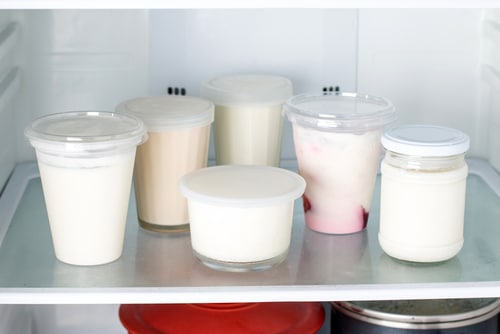Frozen yogurt is a wonderful dessert and a popular alternative to traditional ice cream. While it’s a delicious dessert to enjoy at a local shop or restaurant, many people make their yogurt-based iced treats at home.
Before you try your first frozen dessert recipe, you might consider some crucial details, such as: can you freeze yogurt, and how does it change in the process?
This article contains a step by step guide on how to freeze yogurt and possible recipe ideas for frozen yogurt.
Can You Freeze Yogurt?

Yes, you can freeze yoghurt. Freezing yogurt is an excellent way to preserve it!
There are a few essential steps involved in the freezing process to review before you begin. Homemade frozen yogurt tends to change in texture, which is normal, especially for dairy-based foods. You’ll notice a slight separation in the liquid, and this is also an effect you’ll see with other dairy products, such as sour cream. It’s also familiar with milk.
Any yogurt can be used, though a high-quality Greek yogurt works best. You’ll find that frozen, unopened yogurt is recommended, as this keeps the best in its original form. If you buy yogurt to make a dessert, setting aside one or two tubs or cups of sealed yogurt is ideal.
How to Freeze Yogurt?
Freezing yogurt is easier than you think!
The first step is to set aside adequate space in your freezer and place your unopened containers inside. If you have an enormous container, you may want to split up the contents in portions, which is another option. Yogurt containers can be opened, though if you freeze all or part of the amount, make sure they are sealed in air-tight containers.
Single-serving yogurt cups are perfect for freezing overnight. In just six to eight hours, you’ll find your favorite flavor of frozen dessert ready in the morning. If you decide to create smoothies with yogurt, an ice cube tray is perfect for setting equal-sized molds, which can be transferred into a freezer-safe bag. If you have kids who enjoy yogurt tubes, you can create homemade treats in the same way with a tube mold overnight.
Freezing Yogurt: A Step-by-step Guide

The simplest way to freeze yogurt is directly from the container, without any utensils or equipment at first. Once you have your iced dessert, you’ll need an ice cream scoop or heavy-duty spoon. If you decide to freeze yogurt in smaller portions, you’ll need the following items:
- Parchment paper or a reusable silicone mat
- Cookie or ice cream scoop
- Cookie sheet
Once you have all the supplies, the preparation process is easy with the following steps:
1. Line the cookie sheet with parchment paper so that the entire surface is covered.
2. Carefully scoop a full-sized portion, filling the full spoon or scooper, and place on the parchment paper, evenly spaced, about one inch in between portions.
3. Place the tray on an even surface in the freezer and leave for two or three hours.
4. After about three hours, the frozen yogurt portions can be gently lifted with a spoon and placed into a freezer-safe container or bag.
The frozen yogurt portions will last up to two months. An ice cube tray is another option, though it may take extra effort to remove the portions and transfer them to a bag or container. Once the portions are ready, you can easily use one or two in a smoothie or milkshake.
How Long Will Yogurt Last in the Fridge or Freezer?

Yogurt typically lasts up to two months in the freezer. Ideally, use frozen yogurt within one month to enjoy it at its best. Once it is thawed and placed in the refrigerator, yogurt will last for up to one week. When yogurt is entirely frozen, you’ll have plenty of time to decide how to use it and find new recipes.
Creating a plan for your yogurt may be as simple as making a smoothie every morning, or enjoying a single-serve cup, or saving portions for a series of dessert recipes. Greek yogurt is an excellent source of protein, probiotics, other nutrients, and it’s freezable like other brands or styles of this dairy treat. If you’re new to freezing yogurt, starting with a small portion or single servings is effortless and fun.
How to Tell if Your Frozen Yogurt is Bad
Once your frozen yogurt reaches the two-month mark, it becomes more prone to freezer burn. There is a more significant change in texture once you leave the yogurt in the freezer longer, usually after three months. To capture the best quality in your frozen yogurt, you’ll find it’s best within the first three or four weeks.
Fortunately, yogurt doesn’t go bad in the freezer, though there is a point where it loses the ideal state. Once you thaw yogurt, it should be used up within a week, though if kept frozen, you can generally keep it for the ideal duration of two months. The most significant advantage to freezing yogurt is extending the expiry date and getting more use out of it.
Does Freezing Yogurt Impact the Nutrients or Probiotics?
Fortunately, yogurt doesn’t lose any nutritional value when it’s frozen. This concern is one reason why some people avoid freezing dairy, though as long as yogurt is sealed in an air-tight container or freezer-safe bag, there shouldn’t be any change in nutrients. Greek and Icelandic yogurt are famous for their thick, protein-heavy value and make a great frozen treat.
What to do with Frozen Yogurt
Now that you have your favorite yogurt frozen and ready to use, there are amazing recipes you’ll want to try! One of the first recipes that most people enjoy is a fruit-flavored frozen yogurt ice cream. This recipe is easily blended with frozen yogurt, vanilla extract, lemon juice, sugar (or a sugar substitute), and fresh sliced peaches or berries. Whipped cream makes a great topping, or you can blend it into the dessert as an ingredient.
Create Your Favorite Frozen Yogurt Ice Cream

Frozen yogurt is perfect for any ice cream maker, and you can either use yogurt pre-frozen and thawed or from the refrigerator. You can create any flavor combination, from dark cherries and chocolate syrup, for a black forest cake-inspired dessert or any fresh fruits or ground nuts and seeds to add. Mango kulfi, a traditional Indian frozen dessert, is a beautiful treat to create pistachios, fresh or juiced mangoes, and cardamom.
Yogurt Popsicles and Parfaits

Like ice cream, yogurt popsicles make the perfect snack in the summer and offer lots of options for ingredients. You can blend varieties of berries, peaches, mangoes, and other fruits for a tasty combination, or slice kiwis and strawberries and freeze them in yogurt for a more textured effect. If you enjoy the layered effects of a parfait, frozen or thawed yogurt works beautifully.
Creating Nutrient-rich Smoothies

Frozen yogurt creates a rich, delicious smoothie with lots of vitamins, protein, calcium, and probiotics. It takes the place of many supplements and enhances the smoothness of your drink. You can create a smoothie with any freshly pressed juice, flax seeds, crushed almonds, other nuts, and fresh fruits. Avocado and coconut milk pair well with frozen yogurt, or you can blend bananas and yogurt for fuel before a workout.
Grilled Pineapples and Other Unique Recipe Ideas
If you’re looking for a unique recipe that involves a barbecue, fresh pineapple, and frozen yogurt, you’ll want to try grilled pineapple topped with frozen yogurt.
These delicious treats can be served like an open-faced sandwich, topped with shredded coconut and syrup, or with two slices of pineapple and served like a bagel or burger. There are many significant variations on this recipe, including chocolate chips, sliced almonds, and more.
Freshly baked pies, apple crisp, and other homemade desserts from the oven are delicious with a topping of frozen or slightly thawed yogurt. Frozen yogurt is a healthy topping alternative to traditional ice cream and whipping cream toppings. You’ll find just a scoop or two does the trick!
Summary
Frozen yogurt is one of the most affordable, most straightforward, and fun ways to make the most out of this nutrient-rich dairy food. Once you begin freezing your favorite yogurt cups or portions, you’ll find lots of terrific recipes to explore for many healthy and delicious recipes. Frozen yogurt is the ideal treat on its own, thawed or frozen, as a regular part of a balanced diet.
Related to freezing yogurt:







